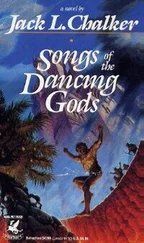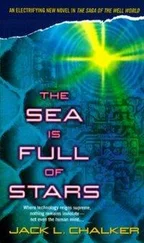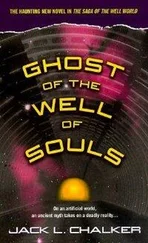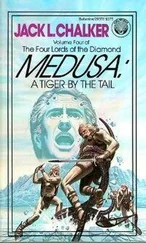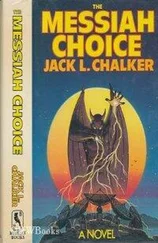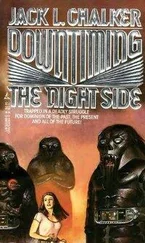Jack Chalker - Echoes of the Well of Souls
Здесь есть возможность читать онлайн «Jack Chalker - Echoes of the Well of Souls» весь текст электронной книги совершенно бесплатно (целиком полную версию без сокращений). В некоторых случаях можно слушать аудио, скачать через торрент в формате fb2 и присутствует краткое содержание. Год выпуска: 1993, ISBN: 1993, Издательство: Del Rey / Ballantine, Жанр: Фантастика и фэнтези, на английском языке. Описание произведения, (предисловие) а так же отзывы посетителей доступны на портале библиотеки ЛибКат.
- Название:Echoes of the Well of Souls
- Автор:
- Издательство:Del Rey / Ballantine
- Жанр:
- Год:1993
- ISBN:0-345-36201-2
- Рейтинг книги:3 / 5. Голосов: 1
-
Избранное:Добавить в избранное
- Отзывы:
-
Ваша оценка:
- 60
- 1
- 2
- 3
- 4
- 5
Echoes of the Well of Souls: краткое содержание, описание и аннотация
Предлагаем к чтению аннотацию, описание, краткое содержание или предисловие (зависит от того, что написал сам автор книги «Echoes of the Well of Souls»). Если вы не нашли необходимую информацию о книге — напишите в комментариях, мы постараемся отыскать её.
Echoes of the Well of Souls — читать онлайн бесплатно полную книгу (весь текст) целиком
Ниже представлен текст книги, разбитый по страницам. Система сохранения места последней прочитанной страницы, позволяет с удобством читать онлайн бесплатно книгу «Echoes of the Well of Souls», без необходимости каждый раз заново искать на чём Вы остановились. Поставьте закладку, и сможете в любой момент перейти на страницу, на которой закончили чтение.
Интервал:
Закладка:
But they also, she had to admit, credited experience. Not that she hadn’t tried that route, but the big openings for her were in the oil industry, and that meant both swallowing a lot of her principles and old ideals and also facing the probability of going off to Third World countries where women had no rights at all and trying to do a job there.
Finally she got this job, one she really loved, thanks to an old professor of hers who had become department head. As an instructor, teaching undergrads basic courses, it hadn’t been the fun it should have been, but it allowed her to work as an assistant on the real research, even if it wasn’t her grant and wouldn’t merit more than a “thanks” in the articles that might be published out of it. Still, she’d done more work in the lab than the professors who would get the credit, trying to show them, prove to them that she was in their league and on their level.
And now she was thirty-six going on thirty-seven, not yet tenured, teaching elementary courses to humanities students who didn’t give a damn but needed these few basic science courses so they could get B.S. instead of B.A. degrees. And she was alone in this mostly stripped apartment, going nowhere as usual and doing it alone.
Not that he’d dropped her. She had been the one to break it off, the one to give the ultimatum. It was always understood that they had an “open” relationship, that they were free to see others and not be tied down. They even laughed at the start about making sure they both had safe sex and got regular tests for any nasties that might be picked up. And she’d meant it at the time. The problem was she’d never fooled around with anybody else after he’d moved in, even though she’d had the chance. She simply didn’t need anybody else. But he’d kept doing it and kept doing it and kept doing it until he’d done it with a regularity that finally showed that he was not about to slow down or become monogamous.
She felt guilty, even now, for being jealous. Worse, it wasn’t based on morality but on her ego. She’d never expected to be so wounded, and it bothered her. What do they have that I don’t? What do they give him that 1 can’t? Am I that bad in bed?
Best not to dwell on it now. Best to pick up the pieces and go on to something else. She was good at that, she thought ruefully. It seemed like all her life she was picking up the pieces and going on to something else.
She slipped out of her clothes, removed her glasses, grabbed some towels, and went in to take a shower. The mirror on the shower wall reflected her back to herself with no illusions. She stepped very close to the glass so that she could see it clearly, her vision without the glasses being perfectly clear for only a foot or so in front of her, then stared at the reflection as if it were someone else, someone she hardly knew.
Her black hair was cut very short, in a boyish cut; it was easy to wash and easy to manage, and it had fewer gray hairs to pluck that way. Her face was a basic oval shape with brown eyes, thin lashes, a somewhat too large nose, and a mouth maybe a bit too wide, but not much. Not an unattractive face, neither cute nor beautiful, but with maturity creeping into its features, hardening them a bit—or was that her imagination?
Average. That’s what she was: average. Not a bad figure but no bathing beauty type, either. Breasts a little too small, hips too wide. With the right clothes she could be very attractive, but this way, unadorned, her body would win no prizes, no envious gazes, no second looks. She looked like a million other women. Generic, that’s me, she thought glumly. I ought to have a little black bar code tattooed on my forehead.
That was the trouble, really, in academia as well. There were women at the top of most scientific disciplines, including hers, none of whom would have any problems being wooed from one major chair to another, writing their own tickets their own way, but they were very few in number because the deck was still stacked. Those women were the geniuses, the intellects who could not be denied. As “attractive” was to “knockout,” so “smart” was to “brilliant.” Intellectually, she knew that the vast majority of people, male or female, could not have attained a doctorate in a field like hers, but it just wasn’t quite enough. Enough to finally teach at a great university, but only as “Instructor in the Physical Sciences”—not just Physics 101, which was bad enough, but, God help her, “Introduction to the Sciences for Humanities Students”—and a lowly assistant on research projects whose grants and control were held by middle-aged male professors.
The shower helped a little, but not much, since it left time for more brooding. Was it the fates that struck her where she was, or was it rather lapses in herself? Was she demanding too much of a guy and maybe too much of herself? With people starving around the world and the working poor standing with their families in soup kitchen lines, did she have any right to complain about a dead-end life if it was such a comfortable, yuppified dead end? Was she being just daddy’s spoiled little girl, in a situation many would envy, depressed because she couldn’t have it all?
A line from one of her undergraduate seminars came to her, fairly or not, and tried to give her some relief from those hard questions. The professor had been a leading feminist and sociologist, and she’d said, “It’s not tough enough being a woman in this day and age, we also have to be saddled with some kind of constant guilt trip, too.”
She was, she knew, at a crisis point in her own life, no matter how miserable other lives might be. She was at an age when biological clocks ticked loudly, at an age when ease of career change was fading fast with each passing page on the calendar, when any move that could be made had to be made or the status quo would become unbreakable. At some point in nearly everybody’s life there came the time when one came to a cliff’s edge and saw a monstrous gap between oneself and the other side, a side that was nearly impossible to make out. She was up for tenure and possible promotion next year, and she’d not heard anything to indicate she wouldn’t get it, although one could never be sure. It was something she wanted, yet it also meant being here, on this side of the chasm, for the rest of her life.
Or she could break away and take real risks and, like most people who did so, fall into the chasm. But all the people who got what and where they wanted, the satisfied movers and shakers, had taken that same risk and made it to the other side. Not all of those people were happier than they’d been before, but many were. The trouble was, she was on the old side for making that leap. She was, after all, in this situation now because she craved stability, not earthquakes. Taking a risk in her personal life would mean saying yes to the first guy who proposed who wasn’t a geek or a pervert. And professionally, to take a risk would mean first having someplace to jump to, and the offers weren’t exactly pouring in, nor did risky opportunity just fall from the sky.
The vortex was never black; rather, it revealed the underside, the sinews, the crisscrossing lines of mathematical force that sustained and essentially stabilized the relevant parts of the universe. The Kraang examined those lines, noted the symmetry and precision, and, this time, noted the relay and junction points. Now, after all those millennia, the slight deviation the Kraang had been able to induce in the last reset had paid off; a line was being followed, not avoided as always before. The Watchman’s line, the focal point for probability itself, the emergency signal and warning beacon for the physics of the governable portions of the cosmos.
Читать дальшеИнтервал:
Закладка:
Похожие книги на «Echoes of the Well of Souls»
Представляем Вашему вниманию похожие книги на «Echoes of the Well of Souls» списком для выбора. Мы отобрали схожую по названию и смыслу литературу в надежде предоставить читателям больше вариантов отыскать новые, интересные, ещё непрочитанные произведения.
Обсуждение, отзывы о книге «Echoes of the Well of Souls» и просто собственные мнения читателей. Оставьте ваши комментарии, напишите, что Вы думаете о произведении, его смысле или главных героях. Укажите что конкретно понравилось, а что нет, и почему Вы так считаете.

